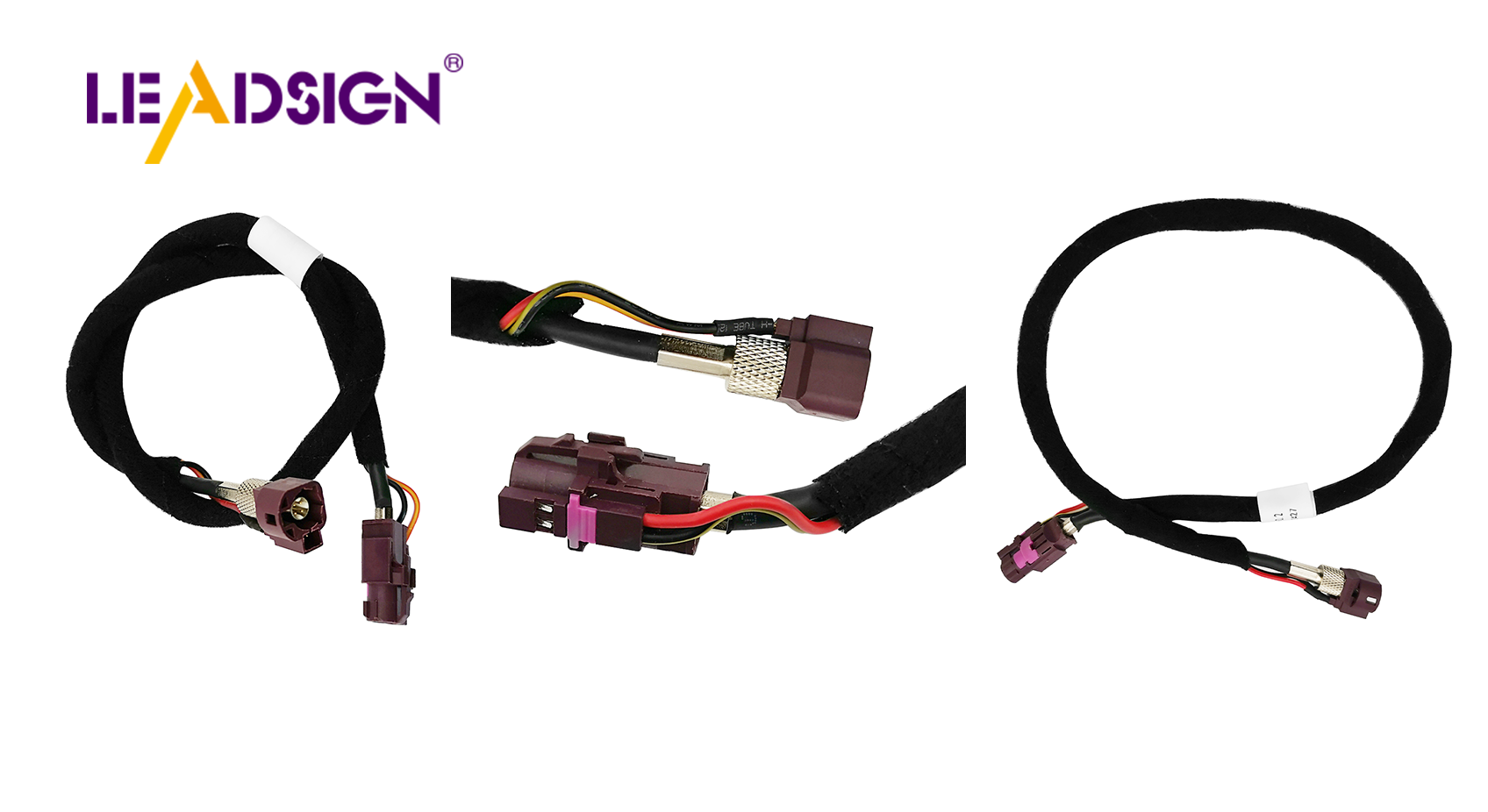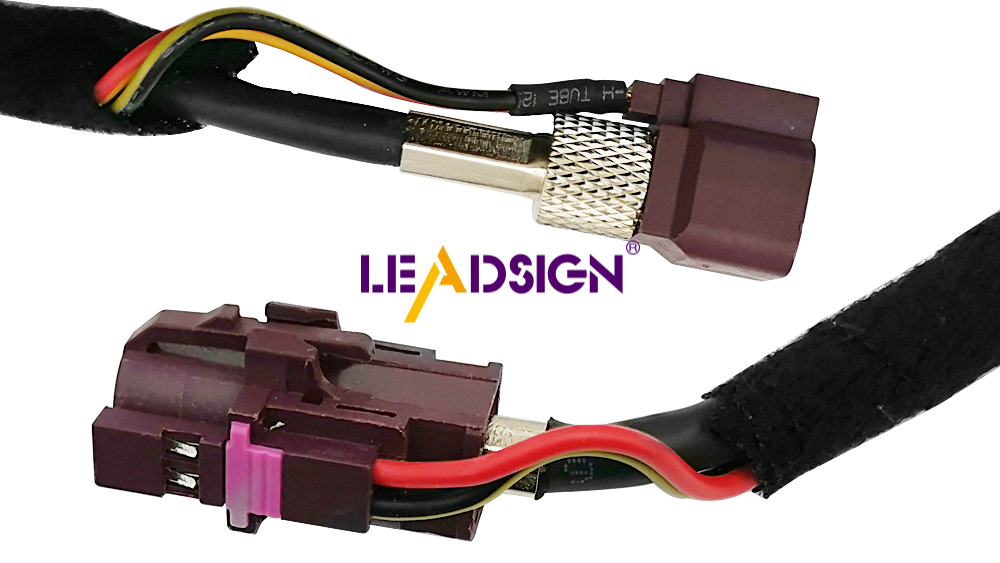Exploring Automotive Networking Through Wire Connector Types

Car wire connectors are important for your car's electrical systems. These tiny parts help different car parts work together, like lights and brakes. Good connectors lower the chance of electrical problems. This makes driving safer and avoids expensive repairs. They also keep power steady, making things work better. Understanding auto wire connector types helps you choose wisely. This keeps your car safe and working well in all situations.
Key Takeaways
Understanding different wire connector types is crucial for maintaining your car's electrical systems and ensuring safety.
Choose connectors based on their specific functions, such as butt connectors for repairs and weatherproof connectors for outdoor use.
Always match the voltage and current limits of connectors to your car's electrical needs to prevent overheating and failures.
Regularly inspect connectors for damage or rust to maintain reliable performance and extend their lifespan.
Use trusted brands like Delphi and Molex for high-quality connectors that withstand tough conditions.
Proper installation techniques, such as crimping and soldering, are essential for creating strong, lasting connections.
Selecting the right connectors not only enhances your car's performance but also saves you money on repairs in the long run.
Overview of Auto Wire Connector Types

Knowing different auto wire connector types helps keep your car working. Each type has a job, making connections strong and reliable. Let’s look at common types, their designs, and materials used.
Common Types of Wire Connectors
Wire connectors have various shapes to fit specific tasks. Here are some popular ones:
Butt Connectors: These join two wires in a straight line. They are safe and insulated, great for fixing or extending wires.
Spade Connectors: Shaped like forks, they attach easily to terminals. They're often used for car lights and gadgets.
Ring Terminals: These form a circle at the end for strong connections. They're used in batteries and grounding systems.
Bullet Connectors: These snap together quickly with male and female ends. They're useful when wires need frequent unplugging.
Weatherproof Connectors: Sealed connectors block water and dirt. They work well outdoors or in tough conditions.
Categorization by Structure and Function
Wire connectors can also be grouped by how they’re built or work:
Crimp Connectors: Crimping tools press these onto wires without soldering. They’re easy to use for car wiring jobs.
Solder Connectors: Wires are soldered to these for a strong bond. Use them where high reliability is needed.
Quick-Disconnect Connectors: These let you connect or disconnect wires fast without tools. They’re handy where parts need regular servicing.
Materials and Design Considerations
Connector materials affect how well they last and perform:
Metal Types: Copper conducts electricity well; aluminum is light and cheap.
Insulation Materials: Insulation shields connections from damage. PVC is flexible; heat-shrink tubing seals tightly.
Car connectors handle heat, shaking, and moisture well. This keeps them dependable in tough places.
By learning about these wire connector types, you can pick the right ones for your car. The right choice means safety, good performance, and lasting results.
How Auto Wire Connectors Are Used in Cars
Learning how wire connectors work helps you choose better. Each type has a special job to keep your car running well.
Power Distribution in Cars
Power distribution depends on strong, reliable connectors. These ensure power flows smoothly to important parts.
Connecting the Battery
Battery connections need tough and secure connectors. They handle high currents and link the battery to the car’s system. Ring terminals are often used because they attach firmly and last long.
Alternator and Starter Systems
Alternators and starters need connectors that resist shaking and high currents. Crimp connectors are common here as they hold wires tightly without soldering. This keeps the engine working properly.
Sending Signals in Cars
Modern cars send signals between systems for data sharing. Good connectors make sure these signals stay fast and accurate.
Sensor Connections
Sensors check how your car is working and send data back. Spade or quick-disconnect connectors are great for sensors since they’re easy to install or replace while keeping signals steady.
Communication Systems (e.g., CAN Bus)
Communication systems like CAN bus use connectors for sending signals between control units. These must support low-voltage signaling for clear data transfer. Wire-to-wire connectors work well here because they’re efficient and dependable.
High-Speed Data (HSD) Connectors
HSD connectors help with infotainment systems like cameras or USBs. They handle fast data speeds needed for modern electronics, making them perfect for digital networks in cars.
"HSD connectors keep advanced car systems running smoothly."
Lights and Accessories
Car lights and gadgets need sturdy connectors to handle power changes and tough conditions.
Headlights and Taillights
Headlights and taillights require moisture-proof, durable connections. Weatherproof connectors are best as they perform well even in bad weather.
Extra Gadgets (e.g., Audio Systems, GPS)
Extra gadgets like GPS or audio systems use bullet connectors for easy setup. Their design makes connecting simple, even if you're not an expert.
By knowing what each connector does, you can pick the right one for your car’s needs. This keeps everything safe, efficient, and long-lasting!
Important Tips for Picking Car Wire Connectors
Picking the right wire connectors keeps your car safe and working well. Think about electrical needs, weather conditions, and if they meet standards.
Electrical Needs
Electrical performance matters when picking connectors. A wrong choice can cause problems or dangers.
Voltage and Current Limits
Connectors have voltage and current limits. Match these to your car's system. High-power parts like batteries need strong connectors. Weak ones can overheat or fail.
Wire Thickness Match
Wire thickness is called gauge. Connectors must fit the wire size tightly. Wrong sizes can cause loose connections or bad electricity flow. Always check the wire size first.
Weather Challenges
Car connectors deal with tough weather daily. They must handle water, heat, cold, and shaking to work well.
Water and Rust Protection
Water harms connections and causes rust. Weatherproof connectors are great for wet areas like headlights. Sealed ones block water and dirt for lasting use.
"Sealed connectors are popular because they protect best from damage."
Heat Resistance
Cars face extreme hot and cold temperatures. Connectors should survive these changes without breaking down. PVC or heat-shrink covers work well in harsh conditions.
Fit and Rules
Good fit ensures connectors work smoothly in your car's system. Following rules makes them safer to use.
OEM vs Aftermarket Choices
OEM connectors are made just for your car model, fitting perfectly but costing more. Aftermarket ones give more choices at lower prices but may not fit as well.
Meeting Safety Standards (e.g., SAE, ISO)
Standards like SAE or ISO make sure connectors are safe to use in cars. Certified products lower risks of problems later on.
By thinking about these points, you can pick the best wire connectors for your car’s needs.
Tips for Installing and Maintaining Car Wire Connectors
Installing and taking care of wire connectors keeps your car working well. Following simple steps can stop problems and make connectors last longer.
Easy Installation Tips
Crimping and Soldering Done Right
Using the right tools makes connections strong and long-lasting. A crimping tool presses the connector tightly onto the wire. Match the connector size to the wire thickness for a good fit. Loose crimped wires can cause electrical issues later.
Soldering gives a stronger connection that lasts longer. Heat the solder evenly so it flows into the joint properly. Don’t overheat, or you might damage the wire cover. A car expert once said:
"Good soldering skills are key to safe car wiring."
Tight Connections Matter
Loose wires can lead to power loss or short circuits. After connecting, gently pull on the wire to check if it's secure. Cover connections with heat-shrink tubing or tape for extra protection from water or shaking.
Keeping Connectors in Good Shape
Check Regularly for Damage or Rust
Look at your connectors often to find problems early. Watch for broken wires, worn covers, or rust buildup (green/white spots). Sealed connectors help block water and dirt, reducing rust risks.
"Sealed connectors protect against moisture, making them last longer."
Check connectors near hot parts like the battery more often since they face more wear.
Replace Broken Connectors Quickly
Bad connectors hurt your car’s performance. Change any that are cracked, burned, or very rusty. Choose OEM parts when replacing since they fit better and meet safety rules.
A DIY fan shared:
"Knowing about connectors helps fix car problems easily."
By following these tips, you keep your car’s wiring safe and reliable. Good care means better performance and safer driving!
Top Brands and Suggestions for Car Wire Connectors
Picking the right wire connectors is easier with trusted brands. These companies make strong, safe, and long-lasting products for car wiring.
Reliable Brands
Delphi
Delphi is a big name in car parts. Their connectors work well in tough conditions, like extreme weather. Delphi focuses on making sure your car’s electrical system stays reliable.
Molex
Molex offers many solderless solutions like splices and quick disconnects. Their products are high-quality and dependable, used in both cars and factories. Many people trust Molex for their automotive needs.
TE Connectivity
TE Connectivity makes connectors for hard-to-handle environments. They offer different sizes and types, like terminal or power connectors. These are easy to use and fit various car systems perfectly.
LEADSIGN (HSD connectors for fast data use)
LEADSIGN shines with its High-Speed Data (HSD) connectors. These are great for modern electronics like cameras or USB ports. They ensure fast data transfer with secure connections, perfect for advanced systems.
"LEADSIGN HSD connectors keep modern car tech running smoothly."
Suggested Types
Weatherpack Connectors
Weatherpack connectors are great for outdoor use. They block water, dirt, and dust to last longer. Use them on headlights or other areas exposed to moisture.
Deutsch Connectors
Deutsch connectors are strong and reliable under tough conditions. They resist shaking and stay secure, ideal for cars that move a lot or face rough environments.
AMP Superseal Connectors
AMP Superseal connectors protect against water and dirt very well. They’re made for important systems like sensors or communication networks where stable connections matter most.
Choosing these brands or models keeps your car’s wiring safe and efficient. Good connectors improve performance while lowering the chance of problems on the road!
Choosing the right car wire connectors keeps your car safe. Good connectors lower repair needs, saving money in the long run. They help your car work better by keeping power steady. Connectors also ensure systems communicate without issues. Installing them properly makes them last longer. Always pick ones that fit well and are strong. Secure connections are important for lasting performance. Smart choices keep your car's electrical parts working well in any situation.
See Also
Enhancing Automotive Data Flow With Superior Connectors And Cables
Uncovering The Advantages Of Fakra Connectors In Vehicles
Transforming Vehicle Connectivity With The Benefits Of HFM Connectors
Understanding HSD Connectors: Essential Knowledge For Automotive Applications
Boosting Data Transfer: Why High-Speed Connectors Matter In Automotive

